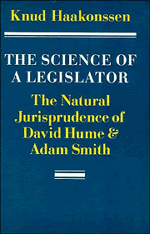Book contents
- Frontmatter
- Contents
- Acknowledgements
- List of abbreviations
- Chapter 1 Introduction
- Chapter 2 Hume's theory of justice
- Chapter 3 Smith's moral theory
- Chapter 4 Smith's theory of justice and politics
- Chapter 5 Smith's analytical jurisprudence
- Chapter 6 Smith's critical jurisprudence
- Chapter 7 Smith's historical jurisprudence
- Chapter 8 Natural jurisprudence in the face of history
- Notes
- Bibliography
- Index
Chapter 4 - Smith's theory of justice and politics
Published online by Cambridge University Press: 04 April 2011
- Frontmatter
- Contents
- Acknowledgements
- List of abbreviations
- Chapter 1 Introduction
- Chapter 2 Hume's theory of justice
- Chapter 3 Smith's moral theory
- Chapter 4 Smith's theory of justice and politics
- Chapter 5 Smith's analytical jurisprudence
- Chapter 6 Smith's critical jurisprudence
- Chapter 7 Smith's historical jurisprudence
- Chapter 8 Natural jurisprudence in the face of history
- Notes
- Bibliography
- Index
Summary
Positive and negative virtues
The two passages in which Smith explicitly criticizes teleological explanations, which we have dealt with at length (see pp. 77–9 above), occur in connection with his theory of justice and that is certainly no coincidence. Nowhere is his theory of the ‘efficient cause’ which selects behaviour clearer and of greater importance than in his account of how just behaviour is selected.
Justice was something of an enigma to both Hume and Smith. Although neither of them set out with the primary aim of formulating a theory of justice in their major philosophical work, both of them gave considerable space to such a theory and both of them kept referring to it in other contexts. The thing which struck them was that justice is so different from all other virtues. It seemed to be more precise and it could therefore be formulated in strict and general rules. Furthermore, men were always prone to enforce those rules. Now, what I suggest is that Smith had a highly original theory of why justice is so precise and, in close connection with this, why it is enforceable.
It may appear as a piece of the high-handed cynicism about man's lot in the world which he always criticizes in the Stoics, when Smith maintains that basically the bulk of mankind is in a position to be happy.
- Type
- Chapter
- Information
- The Science of a LegislatorThe Natural Jurisprudence of David Hume and Adam Smith, pp. 83 - 98Publisher: Cambridge University PressPrint publication year: 1981
- 1
- Cited by

